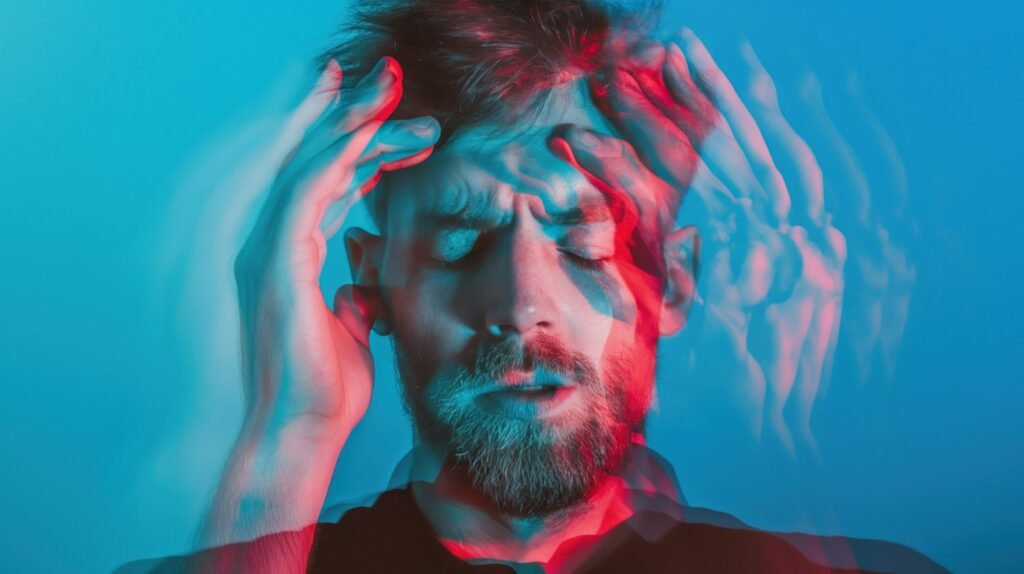Depression
Overview: Depression is a mood disorder characterized by persistent feelings of sadness, hopelessness, and a lack of interest or pleasure in activities.
Symptoms :
– Prolonged sadness or low mood.
– Loss of interest in activities that were once enjoyable.
– Changes in appetite or weight (either increased or decreased).
– Sleep disturbances (insomnia or excessive sleeping).
– Fatigue or lack of energy.
– Difficulty concentrating or making decisions.
– Thoughts of death or suicide.
Treatment :
– Psychotherapy : Cognitive-behavioral therapy (CBT) or interpersonal therapy (IPT) are often effective.
– Medication : Antidepressants such as SSRIs (e.g., fluoxetine) or SNRIs (e.g., venlafaxine).
– Lifestyle Changes : Regular physical activity, healthy diet, and adequate sleep can help manage symptoms.
– Electroconvulsive Therapy (ECT) : In severe cases where other treatments fail, ECT may be recommended.

1.Anxiety Disorders
Overview: Anxiety disorders involve excessive fear or worry that interferes with daily life. They can manifest in various ways, including generalized anxiety, panic attacks, or phobias.
– Symptoms :
– Constant worry or fear.
– Restlessness or feeling on edge.
– Difficulty concentrating.
– Rapid heartbeat, sweating, or trembling.
– Avoidance of certain situations due to fear or anxiety.
– Common Types :
– Generalized Anxiety Disorder (GAD)*: Excessive worry about a wide range of topics.
– Panic Disorder*: Recurrent panic attacks characterized by sudden, intense fear and physical symptoms like chest pain or shortness of breath.
– Social Anxiety Disorder*: Intense fear of social or performance situations.
– Treatment :
– Psychotherapy : CBT is particularly effective for treating anxiety disorders.
– Medication : Anti-anxiety medications (e.g., benzodiazepines) and SSRIs are commonly prescribed.
– Mindfulness and Relaxation Techniques : Meditation, yoga, and breathing exercises can help reduce anxiety.
2.Bipolar Disorder
Overview : Bipolar disorder is characterized by extreme mood swings that include emotional highs (mania or hypomania) and lows (depression).
– Symptoms :
– Manic Episode :
– Elevated or irritable mood.
– Increased energy, hyperactivity, or impulsiveness.
– Racing thoughts and rapid speech.
– Reduced need for sleep.
– Risk-taking behavior (e.g., overspending, reckless driving).
– Depressive Episode : Similar to symptoms of depression (see above).
– Treatment:
– Mood Stabilizers : Lithium, valproate, or carbamazepine are commonly prescribed.
– Antipsychotics : In some cases, antipsychotic medications (e.g., olanzapine) may be used during manic episodes.
– Psychotherapy : CBT and psychoeducation can help individuals manage mood swings.
– Lifestyle Changes : Maintaining regular routines, especially around sleep, is important for managing bipolar disorder.
3.Obsessive-Compulsive Disorder (OCD)
Overview : OCD is characterized by unwanted, recurring thoughts (obsessions) and repetitive behaviors (compulsions) performed to alleviate the distress caused by the obsessions.
– Symptoms :
– Obsessions : Persistent thoughts or fears (e.g., fear of contamination, fear of harming others).
– Compulsions : Repetitive actions performed to reduce anxiety (e.g., hand-washing, checking locks).
– Time-consuming rituals that interfere with daily life.
– Treatment :
– Exposure and Response Prevention (ERP) : A specific type of CBT that is highly effective for treating OCD.
– Medication : SSRIs such as fluvoxamine or sertraline are commonly used.
– Supportive Therapy : Family therapy can help improve the support system for individuals with OCD.
4.Post-Traumatic Stress Disorder (PTSD)
Overview : PTSD develops after experiencing or witnessing a traumatic event, such as combat, a natural disaster, or physical assault. It can cause intense distress and impair a person’s ability to function.
– Symptoms :
– Recurrent, intrusive memories or flashbacks of the traumatic event.
– Nightmares or difficulty sleeping.
– Avoidance of reminders of the trauma.
– Hypervigilance or feeling on edge.
– Emotional numbness or detachment from others.
– Treatment:
– Trauma-Focused CBT: A type of therapy specifically designed for trauma survivors.
– Eye Movement Desensitization and Reprocessing (EMDR) : A therapy that helps reprocess trauma memories.
– Medication : SSRIs are often prescribed, as well as medications to reduce nightmares or anxiety.
– Support Groups: Connecting with others who have experienced trauma can be helpful.
5.Schizophrenia
Overview: Schizophrenia is a chronic, severe mental illness that affects how a person thinks, feels, and behaves. It is characterized by episodes of psychosis, including delusions and hallucinations.
– Symptoms:
– Positive Symptoms(adding behaviors): Hallucinations (hearing voices, seeing things that aren’t there), delusions (false beliefs), disorganized thinking.
– Negative Symptoms (removing behaviors): Reduced ability to function normally, lack of emotion or interest, social withdrawal.
– Cognitive Symptoms: Difficulty concentrating, memory problems.
– Treatment:
– Antipsychotic Medications: Medications such as risperidone, clozapine, or olanzapine are often used to manage psychosis.
– Psychotherapy: Supportive therapy and social skills training are helpful in managing symptoms and improving quality of life.
– Community Support: Assertive community treatment (ACT) teams or case managers can help with long-term management.
6.Eating Disorders
Overview: Eating disorders are mental health conditions characterized by abnormal eating habits and a distorted body image. Common types include anorexia nervosa, bulimia nervosa, and binge eating disorder.
– Symptoms:
– Anorexia Nervosa: Extreme restriction of food intake, fear of gaining weight, distorted body image.
– Bulimia Nervosa: Binge eating followed by purging behaviors (e.g., vomiting, excessive exercise).
– Binge Eating Disorder: Recurrent episodes of eating large quantities of food, accompanied by feelings of guilt or shame.
– Treatment:
– Nutritional Counseling: Restoring healthy eating patterns is a critical part of treatment.
– Psychotherapy: CBT and family-based therapy are effective for treating eating disorders.
– Medication: Antidepressants, especially SSRIs, may be helpful in treating bulimia nervosa and binge eating disorder.
Conclusion
Mental health conditions vary widely in their symptoms, severity, and impact on daily life, but all of them can benefit from proper diagnosis and treatment. Early intervention, therapy, medications, and lifestyle changes can greatly improve quality of life for those struggling with these disorders. Increasing awareness and reducing the stigma around mental health is critical to helping individuals seek the support they need.

